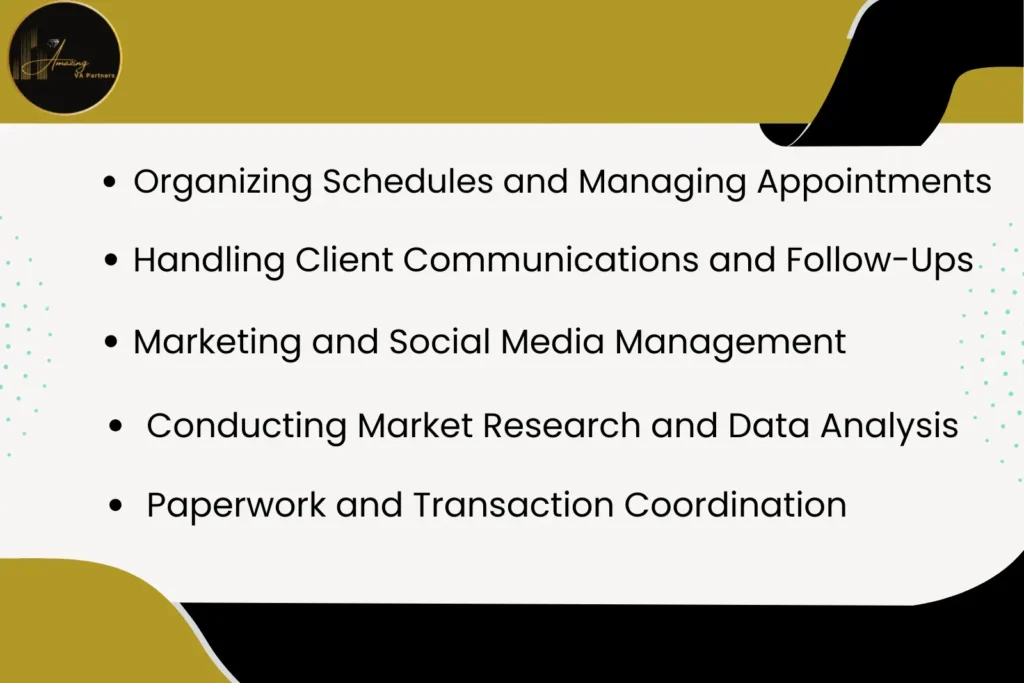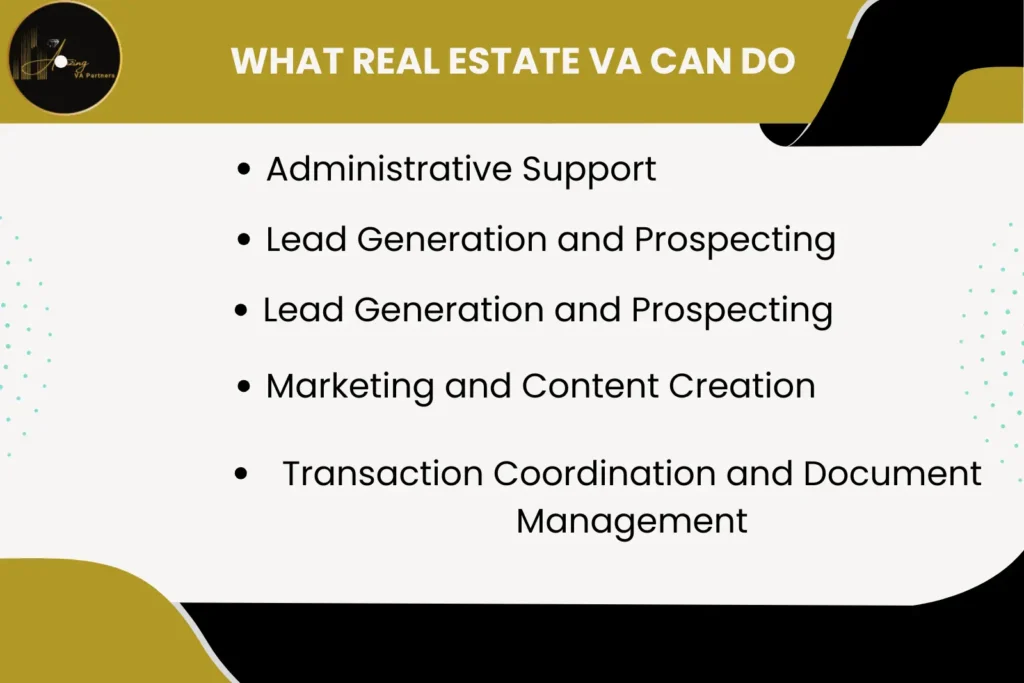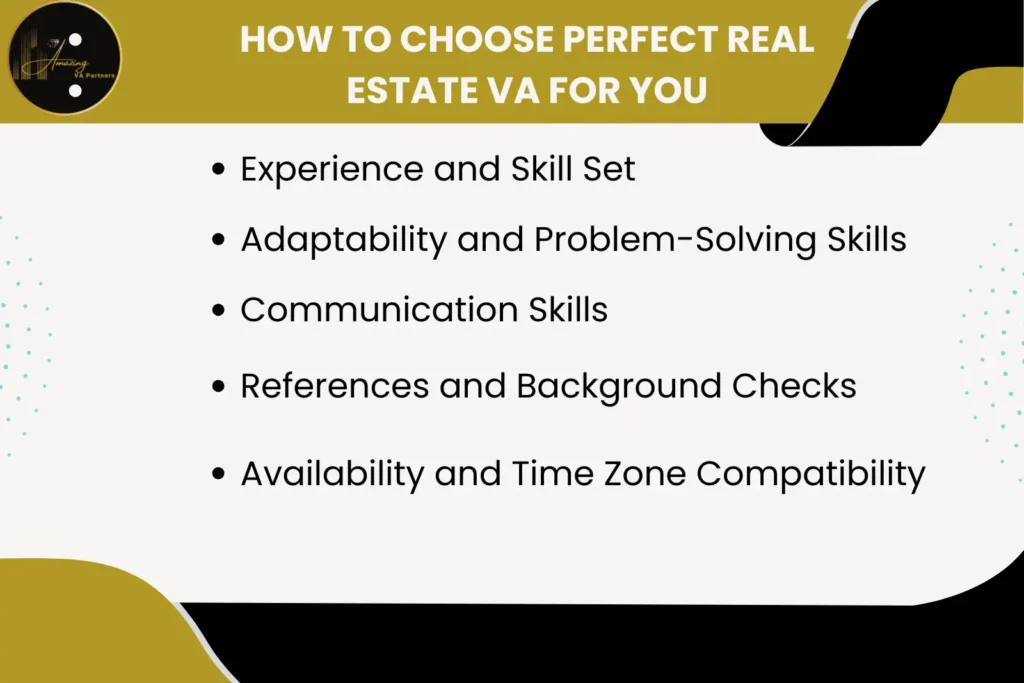The Role of a Virtual Assistant in Supporting Real Estate Agents
What is Real Estate virtual Assistant?
A real estate virtual assistant is a professional who works remotely to handle various tasks, including administrative duties, customer engagement, marketing, and transaction coordination. Unlike an in-house assistant, a VA offers flexibility, allowing you to scale their services according to your business needs. This adaptability is especially valuable in real estate, where market demands can fluctuate seasonally. To explore why a VA can be a more convenient and efficient option than an in-house assistant, check out our blog for an in-depth comparison.
Core Responsibilities of a Real Estate Virtual Assistant

1. Organizing Schedules and Managing Appointments
- A VA can streamline your calendar, avoiding scheduling conflicts and ensuring you never miss an important meeting or property showing. For instance, your VA can arrange client tours back-to-back, maximizing your efficiency throughout the day.
2. Handling Client Communications and Follow-Ups
- Responding promptly to client inquiries is crucial in real estate, where client satisfaction can lead to referrals. A VA can engage with prospective buyers or sellers via email or phone, answering questions, providing updates, and scheduling follow-ups. Consistent communication can lead to a 20-30% increase in lead conversion rates.
3. Marketing and Social Media Management
- Social media is a powerful tool for real estate visibility. A VA skilled in digital marketing can manage your social platforms, creating and scheduling posts, interacting with followers, and running ad campaigns. For instance, they could create targeted posts for open houses, helping increase event attendance and online engagement.
4. Conducting Market Research and Data Analysis
- Staying updated on market trends is key to remaining competitive. A VA can perform research, monitor listings, and compile neighborhood and market reports. This insight helps you accurately price properties and advise clients, ultimately leading to faster transactions and better client satisfaction.
5. Paperwork and Transaction Coordination
- Transaction management is complex, with various stages that require precision. A VA can oversee document preparation, coordinate with clients, and ensure timely completion of tasks. This attention to detail reduces the risk of errors, saving time and preventing costly delays in closing deals.
Types of Real Estate Virtual Assistant Services

1. Administrative Support
- VAs can handle a wide range of administrative tasks like data entry, document management, and CRM updates. This ensures all critical data is up-to-date and accessible, allowing you to make quick, informed decisions.
2. Lead Generation and Prospecting
- Lead generation requires time and persistence. A VA can research potential clients, update lead databases, and manage outreach. This service is invaluable for agents looking to expand their client base without dedicating hours to cold-calling or emailing prospects.
3. Marketing and Content Creation
- Real estate success hinges on visibility. VAs can create and schedule social media posts, design email newsletters, and even write blog content, helping you build a strong online presence and attract new clients.
4. Transaction Coordination and Document Management
- This service is ideal for agents closing multiple deals simultaneously. VAs specializing in transaction coordination can ensure timely document submission, communication with all parties involved, and efficient closing processes.
How to Choose the Right Real Estate Virtual Assistant

Choosing the right VA can significantly impact your business. Here are some key factors to consider:
1. Experience and Skill Set
Look for VAs with experience in real estate or a related field. They should be familiar with real estate-specific software (e.g., MLS, CRM systems) and have knowledge of real estate terminology.
2. Adaptability and Problem-Solving Skills
Real estate is fast-paced, with unexpected challenges. A VA who can adapt quickly and solve problems efficiently will be an invaluable asset.
3. Communication Skills
As a client-facing extension of your business, your VA should be articulate and professional, especially if they handle client communications.
4. References and Background Checks
Check references and reviews to ensure your VA has a track record of reliability and professionalism. Some VAs may also have testimonials or case studies showcasing their previous success with real estate clients.
5. Availability and Time Zone Compatibility
Ensure your VA’s availability aligns with your work hours or peak client contact times, especially if they’re in a different time zone. Clear communication about working hours will prevent delays.
Real-World Applications of Hiring a Real Estate Virtual Assistant
Consider a successful real estate agent managing numerous clients, listings, and property showings. After hiring a VA, they streamlined their operations, reducing administrative work by 40%. The VA took over client communication, scheduled showings, managed marketing, and ensured all documents were prepared before closings. Within months, the agent saw a 30% increase in client satisfaction ratings and a significant uptick in referral business. This is one of many examples of how VAs can make a measurable difference in real estate.
Overcoming Challenges with a Real Estate Virtual Assistant
Onboarding and Training
- Initially, you may need to invest time in onboarding and training your VA. Creating a clear onboarding process with standard operating procedures (SOPs) will streamline this process, making it easier for VAs to learn your business model.
Maintaining Clear Communication
- To prevent miscommunication, schedule regular check-ins and establish a communication protocol, including preferred tools (e.g., Slack, Zoom) and frequency. This structure will ensure your VA is always updated on changing priorities.
Managing Expectations and Setting Boundaries
- Clearly outline job roles, responsibilities, and expected outcomes. This step will help maintain productivity and avoid overlapping duties, which can lead to inefficiencies or misunderstandings.
To save you time and effort, Amazing VA Partners manages the entire process for you—from screening to onboarding—so you can focus on growing your business without the hassle of hiring and training.
Benefits of Hiring a Real Estate VA for Your Business
- Boost in Productivity: By offloading routine tasks, you gain extra hours weekly to focus on building client relationships and securing deals.
- Cost-Effectiveness: Hiring a VA can save up to 60% in overhead costs compared to an in-house assistant, allowing you to allocate more resources to client acquisition and growth.
- Scalability: As your business grows, you can scale your VA’s responsibilities or add more VAs, depending on your operational needs.
- Improved Client Satisfaction: With a VA handling client communication, you can offer a higher level of engagement, leading to stronger client relationships and more referrals.
Read more in our blog to see how a VA can help your real estate business with flexible, efficient support.
Conclusion
A real estate Virtual Assistant can transform your business by streamlining administrative tasks, enhancing client interactions, and supporting marketing efforts. By understanding their unique strengths and choosing a VA that aligns with your business needs, you can save time, reduce costs, and drive growth. Are you ready to elevate your real estate business with the help of our real estate VA?
About the author
What tasks can a real estate VA handle?
A VA can take on tasks like client communication, appointment scheduling, marketing, transaction coordination, and market research.
Are real estate VAs familiar with industry software?
Many VAs have experience with real estate software like CRM systems, MLS databases, and transaction management tools.
What are the typical costs associated with hiring a VA?
VA costs vary depending on experience and skill level but generally range from $8 to $35 per hour. Rates can differ based on the complexity of tasks.
A VA can take on tasks like client communication, appointment scheduling, marketing, transaction coordination, and market research.
Many VAs have experience with real estate software like CRM systems, MLS databases, and transaction management tools.
VA costs vary depending on experience and skill level but generally range from $8 to $35 per hour. Rates can differ based on the complexity of tasks.








One Response
It’s truly very complicated in this full of activity life to listen news on TV, therefore I
only use the web for that reason, and obtain the newest information.
casino en ligne
Your method of describing the whole thing in this paragraph is
actually nice, all be able to without difficulty be aware
of it, Thanks a lot.
casino en ligne
Do you mind if I quote a couple of your posts as long as
I provide credit and sources back to your blog? My website is in the exact same area of interest as yours and
my visitors would definitely benefit from some of the information you present
here. Please let me know if this alright with you. Thanks!
casino en ligne
Wonderful website you have here but I was curious if you knew of any message boards that cover the
same topics discussed in this article? I’d really like to be a
part of group where I can get opinions from other experienced people that share the same interest.
If you have any recommendations, please let me know. Thank you!
casino en ligne
Having read this I thought it was very informative. I appreciate you finding the time and effort to put this informative article together.
I once again find myself spending way too much time both reading and posting
comments. But so what, it was still worthwhile!
casino en ligne
Asking questions are genuinely pleasant thing if you are not understanding anything fully,
except this post provides pleasant understanding even.
casino en ligne
Very good blog you have here but I was wondering if you knew of any forums that cover the same topics talked about here?
I’d really like to be a part of community where I can get comments from other knowledgeable individuals that share the same interest.
If you have any suggestions, please let me know.
Many thanks!
casino en ligne
Hi! I could have sworn I’ve been to your blog before but
after browsing through some of the articles I realized it’s new to me.
Anyways, I’m certainly happy I discovered it and I’ll be book-marking it and checking back regularly!
casino en ligne
I really like your blog.. very nice colors & theme. Did you make this website yourself or did you hire someone to do
it for you? Plz answer back as I’m looking to construct
my own blog and would like to know where u got this from.
cheers
casino en ligne
Hi just wanted to give you a quick heads up and let you know a few of the images aren’t loading correctly.
I’m not sure why but I think its a linking issue.
I’ve tried it in two different browsers and both show the
same results.
casino en ligne